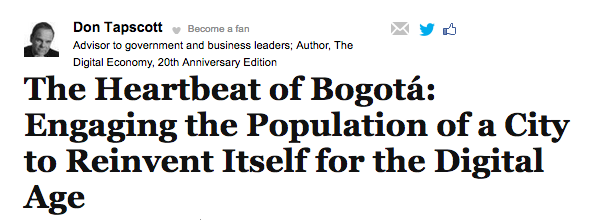I consult as the Community Engagement Director for Don Tapscott’s Open Cities initiative. Open Cities is an international think tank that works to transform municipalites into smart, connected cities for the 21st century.
In 2012, the Bogota Chamber of Commerce engaged us to identify key priorities and engagement strategies during a tumultuous time. Their beloved mayor had completed his two term limit, and the current mayor, along with his brother were on their way to jail for corruption charges.
Don Tapscott writes about our experience in the excerpt below. Read the full article in the Huffington Post.
Around the world our cities are in desperate need of rejuvenation and transformation. Elected officials are scrambling to equip their cities for the 21st century, talking about creating “open,” “networked,” and “smart” cities.
The problems are legion. Mexico City is now one of the most dangerous cities in the world. Megacities such as Sao Paulo and Johannesburg are straining to the point of paralysis from population influx, lack of infrastructure, traffic congestion, pollution and crime.
Many cities in the United States grew rapidly after World War II, but now have dysfunctional urban centers. By separating where we live, work and shop, cities have been divided into downtowns that become ghost towns at night, suburbia where the commute is brutal and the mall where a car is required for all shopping. Detroit has lost more than half of its population and large parts of the city have become a wasteland, populated by wild animals. The median house price is under $10,000.
Fortunately the digital revolution provides a powerful new platform for the transformation of the city. In areas ranging form public safety and transportation to more transparent government operations, the Internet is enabling a new kind of 21st century city.
However, everywhere local government, business and civil society leaders are struggling with the challenges of making change happen. There is a lot of excitement but progress is uneven.
Surprisingly it is a city in the emerging economies that may have discovered a key to success — Bogota the capital of the South American Country of Colombia. And it turns out the best way to transform a city for the digital age is to use those same digital tools to engage the population in reinventing their own municipality.
The beleaguered city has been beset by crime and corruption, but recently residents have become optimistic that improvements are possible. On October 31, Bogota residents elected Gustavo Petro as mayor. He replaced the previous mayor, Samuel Moreno, who had been suspended from office in early May 2011 after charges of bid rigging and accepting kickbacks.
During Moreno’s regime, the city’s coffers had been depleted by massive expenditures in a public transit system. Relatively little work had been completed for the large amounts of money spent. In the wake of the corrupt Moreno mayoralty, there was a crisis of government and a political vacuum. Huge changes were required but it was unclear who would take the lead in achieving it.
The Bogota Chamber of Commerce had been a relatively strong and active organization in the city for many years. Under the leadership of a new CEO Consuelo Caldas, the Chamber wanted to take a more active role in the city’s economic and social development.
With a municipal election scheduled for the end of October, the Chamber saw an opportunity to challenge the mayoral candidates with ideas and proposals to fix the city. But rather than doing the back room lobbying that characterizes municipal politics, it took a different approach. It decided to engage the citizens of Bogota in a process to reinvent their city.
I was fortunate to participate in this process as an adviser, and from my perspective it was an extraordinary exercise that is rich with lessons for anyone wanting to help their own city. The goal was to encourage local businesses, community leaders and citizens to become involved in the city’s affairs.The campaign was called “Set the Hearbeat of Bogota” (HACEMOS LATIR A BOGOTÁ — HLB)
